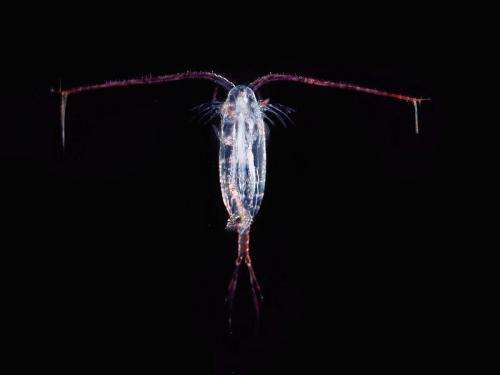February 10, 2015 report
Study shows parasites may resort to sabotage if there are conflicting interests with a host

(Phys.org)—A pair of researchers at the Max Planck Institute has found that for at least one type of parasite existing inside one type of host, sabotage might be at play when there are competing interests. In their paper published in the journal Evolution, Nina Hafer and Manfred Milinski, describe their experiments with tapeworm parasites that live in copepods, a small crustacean and what they learned about the tapeworm's behavior.
Prior research has shown that there are many instances in nature where a parasite causes a change in a host that benefit the parasite. One case is with tapeworms and copepods. The tapeworm parasites move in to their host when they are young and cause the host to swim slower to reduce the chances of being eaten by a larger fish—but when the tapeworm gets older it wants to move to a larger fish so it causes the host to swim faster than normal, increasing the odds of both getting eaten by a large fish. In this new effort, the research pair wanted to know what happens when more than one tapeworm infests a single copepod. To find out, they obtained specimens of both species and watched what happened in the lab.
The researchers found that when both of the parasites were the same age, their efforts appeared to be magnified—the host copepod swam even slower when the parasites were younger and even faster when they were older, suggesting either cooperation or a double dose of whatever the parasites do to change the swimming speed of the copepod. Things were different, however, when they put a young parasite into a copepod along with an older one—the younger one wanted the host to swim slower, while the older one wanted the host to swim faster. In every single case, the older parasite won out. The two competing interests did not cancel each other out, allowing for normal swimming speed by the copepod, instead, the infested crustacean behaved as if there were just the one older parasite inside, swimming faster and benefiting only the older parasite.
The researchers suggest the behavior they observed was an instance of sabotage by the older parasite, though they offer no other evidence. It could just be that the speed change ability of the older parasite was so much stronger than the slow-down effect of the younger, that it was overwhelming.
More information: When parasites disagree: Evidence for parasite-induced sabotage of host manipulation, Nina Hafer andManfred Milinski, Evolution Accepted Article, DOI: 10.1111/evo.12612
Abstract
Host manipulation is a common parasite strategy to alter host behavior in a manner to enhance parasite fitness usually by increasing the parasite's transmission to the next host. In nature, hosts often harbour multiple parasites with agreeing or conflicting interests over host manipulation. Natural selection might drive such parasites to cooperation, compromise or sabotage. Sabotage would occur, if one parasite suppresses the manipulation of another. Experimental studies on the effect of multi-parasite interactions on host manipulation are scarce, clear experimental evidence for sabotage is elusive. We tested the effect of multiple infections on host manipulation using lab bred copepods experimentally infected with the trophically transmitted tapeworm Schistocephalus solidus. This parasite is known to manipulate its host depending on its own developmental stage. Coinfecting parasites with the same aim enhanced each other's manipulation but only after reaching infectivity. If the coinfecting parasites disagree over host manipulation, the infective parasite wins this conflict: the non-infective one has no effect. The winning (i.e. infective) parasite suppresses the manipulation of its non-infective competitor. This presents conclusive experimental evidence for both cooperation in and sabotage of host manipulation and hence a proof of principal that one parasite can alter and even neutralize manipulation by another.
Journal information: Evolution
© 2015 Phys.org



















